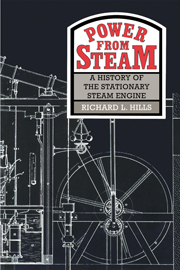Book contents
- Frontmatter
- Contents
- Preface
- Acknowledgements
- List of figures
- List of tables
- 1 The noblest machine
- 2 The impellent force of fire
- 3 Common old smoaking engines
- 4 The economy of power
- 5 The devil of rotations
- 6 Such unbounded power
- 7 Good servants but bad masters
- 8 An uncultivated field
- 9 The new theory of heat
- 10 The internal operation of the machine
- 11 Such absolute smoothness
- 12 Twinkle twinkle little arc
- 13 The drive for efficiency
- 14 An economical source of motive power
- 15 The most economical mode of obtaining power
- Notes
- Bibliography
- Index
4 - The economy of power
Watt's separate condenser and first rotative engines (1765–1785)
Published online by Cambridge University Press: 01 June 2011
- Frontmatter
- Contents
- Preface
- Acknowledgements
- List of figures
- List of tables
- 1 The noblest machine
- 2 The impellent force of fire
- 3 Common old smoaking engines
- 4 The economy of power
- 5 The devil of rotations
- 6 Such unbounded power
- 7 Good servants but bad masters
- 8 An uncultivated field
- 9 The new theory of heat
- 10 The internal operation of the machine
- 11 Such absolute smoothness
- 12 Twinkle twinkle little arc
- 13 The drive for efficiency
- 14 An economical source of motive power
- 15 The most economical mode of obtaining power
- Notes
- Bibliography
- Index
Summary
The person who originated the vital inventions and discoveries for making the first successful rotative engine was James Watt, born at Greenock on the Firth of Clyde in 1736. His paternal grandfather had been a teacher of navigational mathematics while his father and uncle were practised surveyors. In addition, his father's business included marine engineering. On his mother's side, he was related to George Muirhead, a professor of Classics at Glasgow University. With such a background, it was only natural that Watt's interests would lie in similar areas. No one could have imagined that, when Professor James Anderson asked Watt to repair a model of an atmospheric engine belonging to the Natural Philosophy class of the College of Glasgow University during the 1763–4 session, it would be a turning point in the history of civilisation. Watt found that the boiler, although correct in scale, could not supply enough steam to work the model for more than a few strokes. Through his experiments, he found that, at every stroke, the quantity of steam consumed was several times greater than the volume of the cylinder. He also discovered that a great deal more water was needed to condense the steam than he reckoned ought to be necessary if the laws of proportions for mixing liquids of different temperatures applied.
It had long been known that much steam was wasted in atmospheric engines through the heating and cooling of the cylinder at every stroke.
- Type
- Chapter
- Information
- Power from SteamA History of the Stationary Steam Engine, pp. 51 - 69Publisher: Cambridge University PressPrint publication year: 1989



